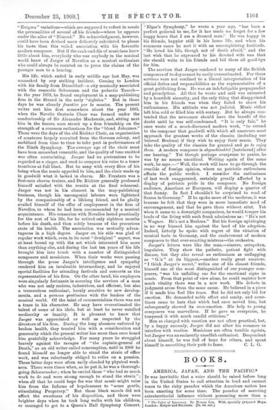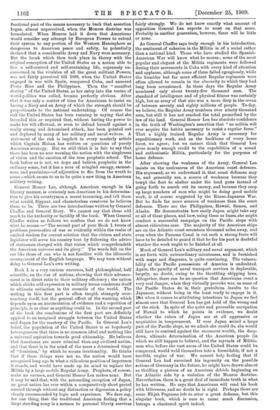BOOKS.
AMERICA, JAPAN, AND THE PACIFIC.* IT was inevitable that a voice should be raised before long in the United States to call attention in loud and earnest tones to the risky paradox which the American nation has been enacting for some time. The paradox of asserting extraterritorial influence without possessing more than a
• The Valor of Ignorance. By Homer Lea. With specially prs2ared Maps. London: Harper and Brothers. ch. Gd. net.3 fractional part of the means necessary to back that assertion began, almost unperceived, when the Monroe doctrine was formulated. When Monroe laid it down that Americans would consider any attempt by European Powers to extend their system to any portion of the Western Hemisphere as dangerous to American peace and safety, he potentially declared that a considerable Army and Navy were necessary. But the break which then took place in theory with the original conception of the United States as a nation able to live a self-centred and self-containing life, supremely un- concerned in the rivalries of all the great militant Powers, was not fairly perceived till 1898, when the United States engaged in war with Spain, conquered Cuba, and annexed Porto Rico and the Philippines. Then the " manifest destiny " of the United States, as her entry into the vortex of world-politics was called, became perfectly obvious. After that it was only a matter of time for Americana to insist on having a Navy and an Army of which the strength should be proportionate to the national undertaking. Of course the risk the United States has been running in saying that she intended this or required that, without having the power to make her will effectual, or even to defend herself against a really strong and determined attack, has been pointed out and deplored by many of her military and naval writers. A statement of the risk is implicit in every masterly article which Captain Mahan has written on questions of purely American strategy. But we still think it is fair to say that there has been no seer warning the nation with the singleness of vision and the emotion of the true prophetic school. The hook before us is not, we hope and believe, prophetic in the ordinary sense, but it has a note of mingled energy, earnest- ness, and pessimism—of adjuration to flee from the wrath to come—which seems to us to be quite a new thing in American military writing.
General Homer Lea, although American enough in his literary manner, is curiously non-American in his determina- tion to give his countrymen a moral trouncing, and tell them what sordid, flippant, and characterless creatures he believes them to be. There are two introductions written by General Chaffee and General Story-. We cannot say that these add much to the authority or lucidity of the book. When General Chaffee writes as follows we confess that we do not know what he means :—" The second part of your Book I. treats of problems provocative of war so evidently within the realm of exalted wisdom for correct solution that the citizen and state legislator will serve his country best by following the advice of statesmen charged with that vision which comprehendeth the American universe and its glory." The words fall on the ear like those of one who is not familiar with the idiomatic arrangement of the English language. We may turn without delay to General Lea's own writing.
Book I. is a very curious excursus, half philosophical, half scientific, on the rise of nations, showing that their advance- ment is in direct ratio to their military efficiency ; the nation which shirks self-expression in military terms condemns itself to ultimate extinction in the councils of the world. The writing in this first part is often turgid, strangely over- reaching itself, but the general effect of the warning, which depends upon an accumulation of evidence and a repetition of principle, is as clear as anything could be. In the second part of the book the conclusions of the first part are definitely applied to an imagined struggle between the United States and Japan for the mastery of the Pacific. In General Lea's belief, the population of the United States is so hopelessly heterogeneous that there is no common ideal and nothing like a universal aspiration towards good citizenship. He believes that Americans are more criminal than any civilised nation, and that there is in the mind of the mass a determined tinge of "feminism," by which be means irrationality. He thinks that if these things were not so, the nation would have recognised long ago in what a ridiculous position of impotence it stands, and would have made up its mind to replace the Militia by a large mobile Regular Army. Prophets, of course, make no excuses, and General Homer Lea makes none. But it may be said that, with the astounding exception of Japan, no great nation has ever within a comparatively short period carried through without any distraction or digression a policy clearly recommended by logic and experience. We dare say, for one thing, that the traditional American feeling that ,a large standing army is a, menace to personal liberty survives fairly strongly. We do not know exactly what amount of opposition General Lea expects to meet on that score. Probably in another generation, however, there will be little or none.
As General Chaffee says truly enough in his introduction, the sentiment of cohesion in the Militia is of a social rather than a national kind. Those who have studied the Spanish- American War will know what he means ; some of the most popular and elegant of the Militia regiments were followed
during their movements in Cuba with every kind of attention and applause, although some of them failed egregiously, while the humbler but far more efficient Regular regiments were often allowed to remain in the obscurity to which they had long been accustomed. In those days the Regular Army numbered only about twenty-five thousand men. The standard of intelligence and of physical fitness was certainly high, but an army of that size was a mere drop in the ocean of between seventy and eighty millions of people. To-day, we believe, the Regular Army numbers over ninety thousand men, but still it has not reached the total prescribed by the law of the land. General Homer Lea has absolute confidence in the truth of Washington's assertion that "no militia will ever acquire the habits necessary to resist a regular force." That a highly trained Regular Army is necessary for expeditionary work, and as the backbone of every home force, we agree; but we cannot think that General Lea gives nearly enough credit to the capabilities of a sound and enthusiastic Militia, particularly for the purposes of home defence.
After showing the weakness of the Army, General Lea insists on the uselessness of the American coast defences. His argument, as we understand it, that coast defences may be, and generally are, a source of weakness because they tempt the fleet to shelter under the land guns instead of going forth to search out its enemy, and because they coop up large numbers of men who might be doing good mobile work, is of course suggested by the Russo-Japanese War. But he finds far more sources of weakness than the coast defences. There are the Philippines, Hawaii, Samoa, and Alaska. He demonstrates how easily Japan might take any or all of these places, and how, using them as bases, she might conduct a successful campaign on the Pacific slope with almost ridiculous ease. The majority of the American ships are on the Atlantic coast seventeen thousand miles away, and even when the Panama Canal is cut such a strong force will have to be detailed to guard it that he for his part is doubtful whether the work ought to be finished at all.
Much of General Lea's military and naval argument, which is set forth with extraordinary minuteness, and is furnished with maps and diagrams, is quite convincing. The vulnera- bility of the Pacific possessions of America is undoubted. Again, the paucity of naval transport services is deplorable, largely, no doubt, owing to the throttling shipping laws. Altogether, there can be no question that Americans court a very real danger, when they virtually provoke war, as some of the Pacific States do in their gratuitous insults to the Japanese, 'without being in the least ready to engage in it. Thit when it comes to attributing intentions to Japan we feel almost sure that General Lea has got hold of the wrong end of the stick. In spite of the quiet and peaceable occupation of Hawaii to which he points in evidence, we doubt whether the rulers of Japan are at all aggressive or acquisitive in temperament. If ever Japan seized a large part of the Pacific slope, as we admit she could do, she would still have to contend against the enormous wealth, the deep. down, ultimate determination of the American people (in which we still happen to believe), and the myriads of Militia- men who, before the vast areas of the United States could bo conquered, would weld themselves into a formidable, if not a terrible, engine of war. We cannot help feeling that if General Lea had exercised his ingenuity on the possible actions of Germany in the future, he might have drawn'almost as thrilling a picture of an American debacle beginning on the Atlantic side by a violation of the Monroe doctrine. Nevertheless, there is a great deal of immediate truth in what he has written. He says that Americans will read his book with bitterness, and no doubt he is right. Perhaps there are some Elijah Pograms left to utter a great defiance, but this singular book, which is sure to cause much discussion, betrays a chastened spirit indeed.



































 Previous page
Previous page